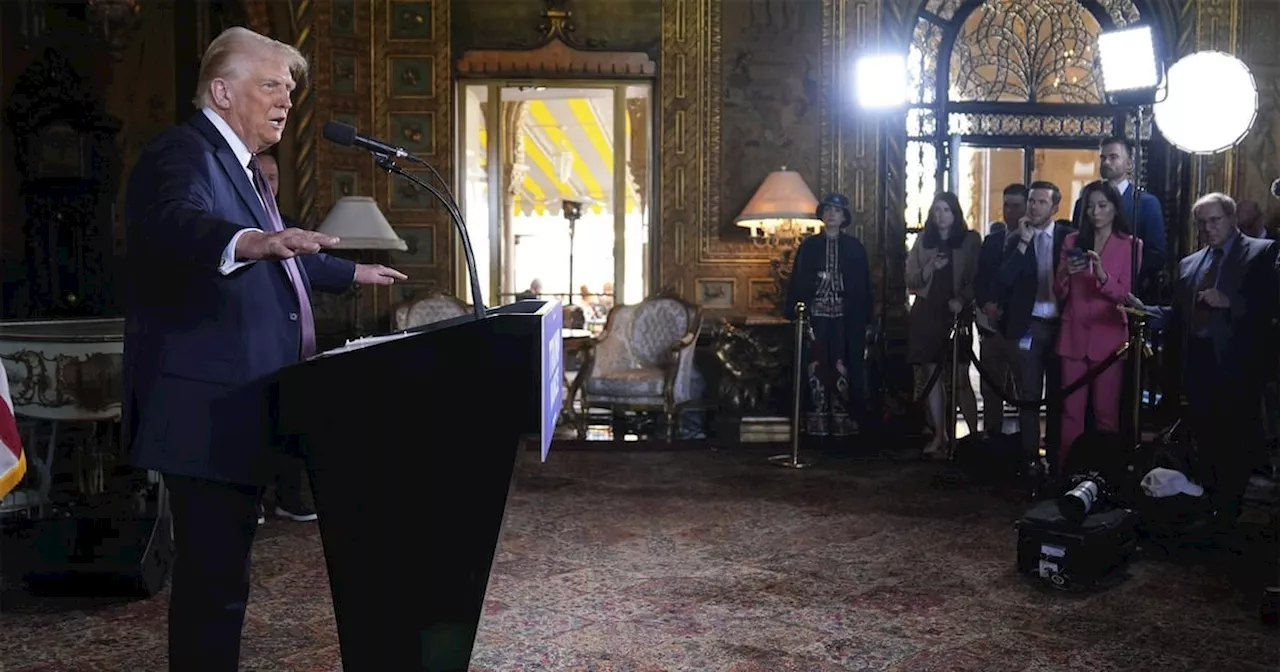U.S. equity futures declined Tuesday as investors sought safety in haven assets like the dollar and gold following President Donald Trump's announcement of 25% tariffs on all U.S. imports of steel and aluminum. The S&P 500 and Nasdaq 100 futures both fell around 0.2 percent, while the U.S. dollar index gained ground, and gold prices surged to an all-time high. Markets are closely monitoring the potential impact of these tariffs on global trade and are also awaiting key inflation data and Federal Reserve Chair Jerome Powell's testimony before Congress this week.
U.S. equity futures declined Tuesday, while the dollar and gold strengthened, suggesting investors are shifting away from risk following President Donald Trump's imposition of a 25 percent tariff on all U.S. imports of steel and aluminum. Contracts for the S&P 500 and Nasdaq 100 both dipped roughly 0.2 percent, mirroring a broader trend of risk aversion. The dollar index ticked higher, building on Monday's gains, while gold surged past $2,921, reaching an all-time high briefly.
This safe-haven demand for gold and the dollar came as investors grappled with the implications of Trump's tariffs. Trump's announcement targeted steel and aluminum shipments from all countries, including key trading partners such as Mexico and Canada, starting March 4. However, he signaled a possible exemption for Australia. This move follows his earlier indication that he would unveil retaliatory tariffs this week against nations imposing taxes on U.S. imports. Market participants are closely watching the potential ripple effects of these trade tensions.Hartmut Issel, head of APAC equities and credit for UBS Wealth Management, emphasized the gravity of the situation, stating that the tariffs are not a negligible factor. He advised a diversified portfolio consisting of U.S. stocks, high-grade bonds, and gold as a hedge against these tariff-related risks. Alongside the global trade outlook, investors are also scrutinizing this week's crucial inflation data and Federal Reserve Chair Jerome Powell's testimony before Congress. The New York Fed's Survey of Consumer Expectations revealed that expected inflation rates for the next year and three years remained unchanged at 3 percent in January. Chris Larkin, of E*Trade from Morgan Stanley, underscored the significance of these factors, stating that they are poised to dominate market discourse.On Wall Street, technology stocks continued their upward trajectory, with Nvidia Corp. extending its five-day surge to 15 percent and Meta Platforms Inc. recording its 16th consecutive session of gains. United States Steel Corp. and Alcoa Corp. followed the upward movement in metal prices. An index of American-listed Chinese shares also rose for the third day in a row. Notably, hedge funds emerged as significant buyers of U.S. stocks last week, reversing their previous bearish stance in the wake of better-than-expected earnings reports. Goldman Sachs Group Inc.'s prime brokerage report revealed that they purchased U.S. equities at the fastest pace since November, resulting in the heaviest net buying of individual stocks in over three years. This surge in buying activity was particularly concentrated in the information technology sector.The S&P 500 gained 0.7 percent on Monday, while the Nasdaq 100 climbed 1.2 percent. The yield on 10-year Treasuries remained virtually unchanged at 4.5 percent. The Bloomberg Dollar Spot Index advanced 0.2 percent, and gold surpassed $2,900 per ounce. Oil prices increased from near their lowest levels this year as a decline in Russian production alleviated concerns about a supply surplus. Despite this resilience in stocks amidst tariff concerns, strategists at Deutsche Bank AG, including Binky Chadha, warn that further trade escalation might trigger equity pullbacks. They posit that these pullbacks will likely follow a pattern similar to geopolitical shocks, characterized by sharp but short-lived selloffs. Historically, equities tend to bottom out even as the event persists, recouping losses before any de-escalation. In such scenarios, equities typically weaken 6 percent to 8 percent, declining for three weeks before rebounding for three weeks. Christian Floro, of Principal Asset Management, emphasizes that the greatest market risk likely stems from policy unpredictability. In this volatile environment, he stresses the importance of diversification to manage portfolio risk and capitalize on opportunities as companies, countries, and markets adapt to these shifting dynamics.
TARIFFS TRADE INVESTORS GOLD DOLLAR EQUITY FUTURES FEDERAL RESERVE INFLATION
Canada Latest News, Canada Headlines
Similar News:You can also read news stories similar to this one that we have collected from other news sources.
 Canada Prepares C$150 Billion Tariff List Against US if Trump Imposes DutiesCanada has drawn up an initial list of C$150 billion worth of US-made goods that it would target with retaliatory tariffs if President-elect Donald Trump imposes tariffs on Canadian products. The list, which is a draft and would only be activated if the Trump administration takes action first, could be expanded depending on the US response. The move comes after a meeting of Canadian Prime Minister Justin Trudeau and provincial leaders to strategize against potential US protectionism.
Canada Prepares C$150 Billion Tariff List Against US if Trump Imposes DutiesCanada has drawn up an initial list of C$150 billion worth of US-made goods that it would target with retaliatory tariffs if President-elect Donald Trump imposes tariffs on Canadian products. The list, which is a draft and would only be activated if the Trump administration takes action first, could be expanded depending on the US response. The move comes after a meeting of Canadian Prime Minister Justin Trudeau and provincial leaders to strategize against potential US protectionism.
Read more »
 Cornwall, Ont. preparing for drop in cross-border traffic if Trump imposes tariffsThe mayor of Cornwall, Ont. says he’s preparing for a possible drop in traffic at the Canada-U.S. border if incoming president Donald Trump follows through with a threat to impose heavy tariffs on Canadian goods.
Cornwall, Ont. preparing for drop in cross-border traffic if Trump imposes tariffsThe mayor of Cornwall, Ont. says he’s preparing for a possible drop in traffic at the Canada-U.S. border if incoming president Donald Trump follows through with a threat to impose heavy tariffs on Canadian goods.
Read more »
 Canadian Government Prepares Retaliation if Trump Imposes TariffsSources indicate that the Canadian government is formulating an initial response plan to retaliate against potential tariffs imposed by the Trump administration.
Canadian Government Prepares Retaliation if Trump Imposes TariffsSources indicate that the Canadian government is formulating an initial response plan to retaliate against potential tariffs imposed by the Trump administration.
Read more »
 Canada Prepares for Retaliation if Trump Imposes Tariffs, Chocolate Shop Opens Amidst Diverse StoriesCanadian government officials are gearing up to retaliate if US President Donald Trump follows through with his threat to impose additional tariffs on Canadian goods. Meanwhile, a new chocolate shop in Edmonton enjoys an impressive community response, while another bids farewell. News from across Canada includes a Nazi symbol dispute, a fundraiser for addiction treatment, a home invasion, and a historic welcoming of a child from Gaza seeking medical help.
Canada Prepares for Retaliation if Trump Imposes Tariffs, Chocolate Shop Opens Amidst Diverse StoriesCanadian government officials are gearing up to retaliate if US President Donald Trump follows through with his threat to impose additional tariffs on Canadian goods. Meanwhile, a new chocolate shop in Edmonton enjoys an impressive community response, while another bids farewell. News from across Canada includes a Nazi symbol dispute, a fundraiser for addiction treatment, a home invasion, and a historic welcoming of a child from Gaza seeking medical help.
Read more »
 B.C. Economy Would Suffer 'Disaster' if Trump Imposes 25% Tariff, Says Premier EbyPremier David Eby warns of a 'disastrous' impact on British Columbia's economy if former U.S. President Donald Trump follows through with a 25% tariff on Canadian goods.
B.C. Economy Would Suffer 'Disaster' if Trump Imposes 25% Tariff, Says Premier EbyPremier David Eby warns of a 'disastrous' impact on British Columbia's economy if former U.S. President Donald Trump follows through with a 25% tariff on Canadian goods.
Read more »
 Canada Threatens Retaliation if Trump Imposes TariffsPrime Minister Justin Trudeau vows Canada will 'respond' to potential 25 percent tariffs on Canadian goods by U.S. president-elect Donald Trump, stressing 'everything is on the table' as a countermeasure. Canadian officials say Republicans in Washington may not fully grasp the economic implications of Trump's tariff plan.
Canada Threatens Retaliation if Trump Imposes TariffsPrime Minister Justin Trudeau vows Canada will 'respond' to potential 25 percent tariffs on Canadian goods by U.S. president-elect Donald Trump, stressing 'everything is on the table' as a countermeasure. Canadian officials say Republicans in Washington may not fully grasp the economic implications of Trump's tariff plan.
Read more »
